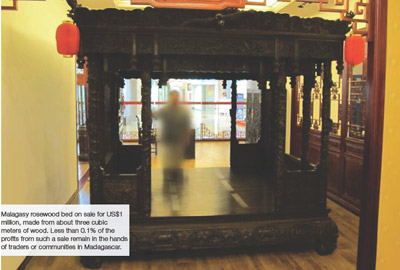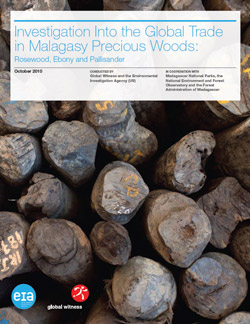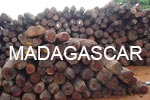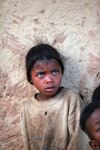Consumer demand for rosewood furniture and musical instruments is driving illegal logging in Madagascar’s national parks, endangering wildlife and undermining local community livelihoods, according to a new report from the Environmental Investigation Agency (EIA) and Global Witness.
The report, based on more than a year of investigations, shows that Madagascar’s valuable hardwoods—including ebony, pallisander, and rosewood—are being illegally harvested from rainforest parks and trafficked to Asia, Europe, and the United States. The vast majority of timber—98 percent—however ends up in China, where it is converted into luxury furniture.
“In China, Malagasy rosewood beds sell for a million dollars apiece, yet less than 0.1% of the profits remain with local people,” said Alexander von Bismarck of EIA, in a statement. “I don’t think the buyers of these beds would sleep well at night if they knew the full story behind their beds.”

|
Von Bismarck added that the investigations found Chinese traders were often aware that the wood they bought was illegal.
Trade in rosewood has been banned since March 2010 when the “transition authority” — the group that seized control of the country in March 2009 — established a moratorium on the logging and trade of precious hardwoods in response to international outcry. Nevertheless recent reports indicate logging continues in Masoala and Makira, rainforest areas recognized as a Global World Heritage Site.

The chart shows the indicative price for the rosewood used in a $60,000 rosewood cabinet in Shanghai, at different points in the supply chain. Image courtesy of EIA/GW.
In its report, EIA and Global Witness say there are encouraging signs that the transition government is taking measures to stem the trade, but argue that governments of consuming countries need to do more to control imports of illegal timber. The report points last year’s raid of Gibson Guitar by U.S. authorities under the Lacey Act as an important example of intervention in the illicit timber market.
 Investigation Into the Global Trade in Malagasy Precious Woods: Rosewood, Ebony and Pallisander |
“We welcome the latest indications from the Madagascan government,” said Reiner Tegtmeyer of Global Witness, “However, past experience has shown that such measures are often undermined by special exemptions and
weak implementation. To plug the gaps, governments of all timber-consuming countries must follow the example of the US and crack down on import of illegal timber.”
“China’s response to these findings will be critical for Madagascar’s biodiversity. China has a great opportunity to help put an end to illegal timber trade and protect biodiversity,” added von Bismarck.
Rosewood logging erupted in the aftermath of the 2009 coup. Tens of thousands of hectares were affected, including some of the island’s most biologically diverse national parks: Marojejy, Masoala, and Makira. Illegal logging spurred the rise of a commercial bushmeat trade. Hunters slaughtered rare and gentle lemurs for restaurants. Timber trafficking, which involved armed gangs marauding through national parks, also hurt tourism, a critical source of direct and indirect income for many local communities. Rosewood traders intimidated and, in some cases, attacked those who attempted to stop the plunder.
Investigation Into the Global Trade in Malagasy Precious Woods: Rosewood, Ebony and Pallisander
Related articles
Despite pledge to crack down, illegal logging continues in Madagascar’s rainforest parks
(09/06/2010) Despite government assurances that it would crack down on the rosewood trade, illegal logging continues in Madagascar’s rainforest parks, according to new information provided by sources on the ground.
The illegal logging cycle in Madagascar
(06/23/2010) The latest issue of the journal Madagascar Conservation & Development provides a comprehensive look into Madagascar’s illegal logging trade, which has generated more than $200 million for a small group of individuals over the past year. The trade, which spikes just prior to national elections and may be a source of funds for ruling politicians, has taken a heavy toll on the lowland rainforests of Madagascar, with targeted species now at risk of extinction.
Rainforest slaughter continues in Madagascar despite “ban” on timber exports

(06/21/2010) New eyewitness reports indicate continued logging of Madagascar’s Masoala National Park for rosewood despite a government “moratorium” on logging and timber exports. A source near Marofinaritra, a town between Masoala and Antalaha, reports heavy night-time movement of trucks carrying illegally logged timber from the park. The wood is believed to be destined for Antalaha, a regional hub for the rosewood trade.
Madagascar bans rainforest timber exports following global outcry

(03/25/2010) Under mounting pressure over illegal logging of its national parks, Madagascar’s transitional government on Wednesday reinstated a ban on rosewood logging and exports. The decree (no. 2010-141), which prohibits all exports of rosewood and precious timber for two to five years, was announced during a council meeting held yesterday at Ambohitsorohitra Palace in Antananarivo, Madagascar’s capital city.
How to end Madagascar’s logging crisis

(02/10/2010) In the aftermath of a military coup last March, Madagascar’s rainforests have been pillaged for precious hardwoods, including rosewood and ebonies. Tens of thousands of hectares have been affected, including some of the island’s most biologically-diverse national parks: Marojejy, Masoala, and Makira. Illegal logging has also spurred the rise of a commercial bushmeat trade. Hunters are now slaughtering rare and gentle lemurs for restaurants.
Satellites being used to track illegal logging, rosewood trafficking in Madagascar

(01/28/2010) Analysts in Europe and the United States are using high resolution satellite imagery to identify and track shipments of timber illegally logged from rainforest parks in Madagascar. The images could be used to help prosecute traders involved in trafficking and put pressure on companies using rosewood from Madagascar.
Coup leaders sell out Madagascar’s forests, people

(01/27/2010) Madagascar is renowned for its biological richness. Located off the eastern coast of southern Africa and slightly larger than California, the island has an eclectic collection of plants and animals, more than 80 percent of which are found nowhere else in the world. But Madagascar’s biological bounty has been under siege for nearly a year in the aftermath of a political crisis which saw its president chased into exile at gunpoint; a collapse in its civil service, including its park management system; and evaporation of donor funds which provide half the government’s annual budget. In the absence of governance, organized gangs ransacked the island’s biological treasures, including precious hardwoods and endangered lemurs from protected rainforests, and frightened away tourists, who provide a critical economic incentive for conservation. Now, as the coup leaders take an increasingly active role in the plunder as a means to finance an upcoming election they hope will legitimize their power grab, the question becomes whether Madagascar’s once highly regarded conservation system can be restored and maintained.